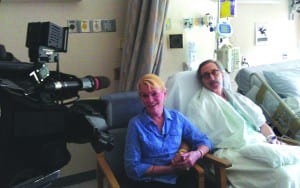
“That Dr. Peter Franklin is alive today is nothing short of a miracle,” said Dr. Gervasio Lamas, chief of the Columbia University Division of Cardiology at Mount Sinai Medical Center. Dr. Franklin went into cardiac arrest and almost died on the cardiac catheterization lab table when Mount Sinai cardiologists were able to revive him and bring him back to life.
A 63-year-old radiologist from Boston, Mass., Dr. Franklin was vacationing in Marathon Key with his wife, Kathleen, in January. After feeling chest pains while taking a walk, Dr. Franklin went to a hospital in the Keys to have doctors examine him. He also called his cardiologist back home in Boston. His doctor advised him that he needed to get to a skilled medical facility immediately and told him to go to Mount Sinai. Heeding his cardiologist’s advice, Dr. Franklin went to Mount Sinai by ambulance and scheduled himself to have an elective cardiac catheterization done the next day.
Dr. Franklin, who is skilled in reading cath lab images, watched as Dr. Nirat Beohar, director of the Mount Sinai Cardiac Catheterization Laboratory, began examining his heart to detect blockages, or occlusions.
“I hope it’s not the widow maker,” Dr. Franklin said to Dr. Beohar, referring to the nickname that describes a highly stenotic, or severely narrowed, left anterior descending coronary artery.
It earned its nickname because if the artery abruptly becomes completely blocked, it can cause a massive attack that likely will lead to sudden death. It turns out that it was a widow maker, and Dr. Franklin went into severe cardiac arrest at the very moment that Dr. Beohar spotted the occlusion.
Dr. Franklin lost massive amounts of blood and plasma. Whatever blood he did not lose began going into tongue, kidneys and other organs. He was without oxygen for almost 15 minutes. A team of two doctors, five nurses and five technicians sprinted into action. Doctors immediately got through the occlusion, dilated his artery and placed a stent to preserve the artery. Then they used an impellar pump to help stabilize blood flow to the heart.
“We also used therapeutic hypothermia, which is putting the patient to sleep and then freezing his body to 34 degrees Celsius for 24 hours,” said Dr. Beohar. This methodical approach halts the body’s natural inflammatory response and is carefully coordinated among physicians in an emergency room or cath lab to avoid brain damage after cardiac arrest.
“This enabled us to preserve Dr. Franklin’s brain function,” Dr. Beohar explained. “If we had not used it, even though we were able to bring him out of cardiac arrest, there would have been a great chance that he would have had brain damage.”
“I shouldn’t be alive,” said Dr. Franklin. “I was truly in the right place at the right time. This heart attack was going to happen within hours and if I had been anywhere else, I’d be dead right now.”
His wife, Kathleen, agreed.
“I had no hope that he would live and if he did, there was a strong chance he would be a vegetable,” she said. “What happened is nothing short of the best medicine possible.”
The Mount Sinai Heart Institute is one of Florida’s premier cardiovascular programs, offering patients the best heart attack survival rate in Florida.* Its academic affiliation with New York’s elite Columbia University is the only Ivy League partnership of its kind in South Florida and recognizes the outstanding, results-driven cardiac care.
*Source: CMS Hospital Compare data






